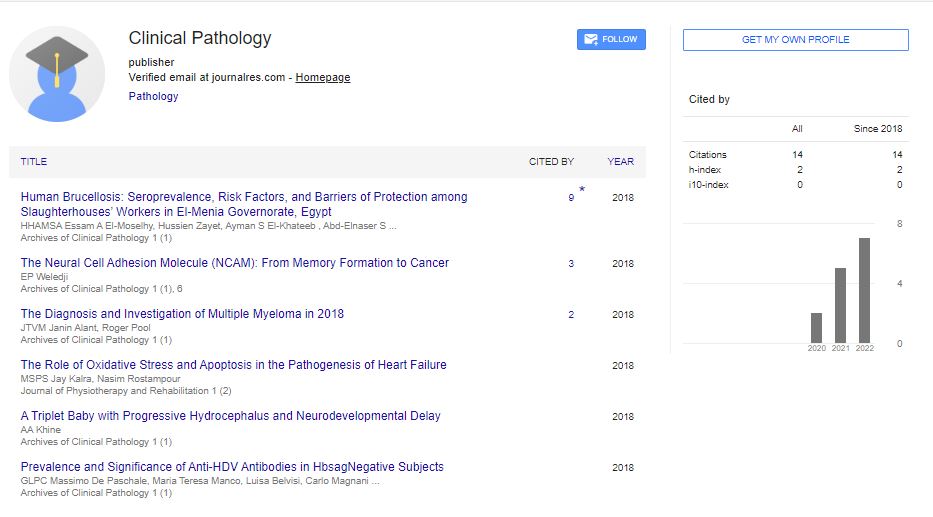Perspective, Arch Clin Pathol Vol: 6 Issue: 1
Effect of Clinical Microbiology on Modern Health Care
Joseph Nick*
Department of Pharmacy, University of Pittsburgh Medical Center, Pittsburg, United States of America
*Corresponding Author: Joseph Nick
Department of Pharmacy, University of Pittsburgh Medical Center, Pittsburg, United States of America;
E-mail: josephnick@upm11.edu
Received date: 20 February, 2023, Manuscript No. ACPY-23-96267;
Editor assigned date: 22 February, 2023, PreQC No. ACPY-23-96267 (PQ);
Reviewed date: 09 March, 2023, QC No. ACPY-23-96267;
Revised date: 16 March, 2023, Manuscript No. ACPY-23-96267 (R);
Published date: 23 March, 2023, DOI: 2324-8955/acpy.05.03.100079
Citation: Nick J (2023) Effect of Clinical Microbiology on Modern Health Care. Arch Clin Pathol 6:1.
Description
Clinical microbiology is an essential component of modern healthcare, playing a key role in disease diagnosis, treatment, and prevention. It involves the study of microorganisms such as bacteria, viruses, fungi, and parasites that cause infections in humans. With the emergence of new infectious diseases, the importance of clinical microbiology has become more apparent than ever before. Infectious diseases are a leading cause of morbidity and mortality worldwide. Accurate and timely diagnosis is necessary for the effective management of infectious diseases.
Clinical microbiology laboratories utilize various techniques to identify pathogens and determine the most appropriate treatment options. These techniques include culturing microorganisms, microscopy, serology, molecular testing, and antimicrobial susceptibility testing. Culturing microorganisms is a fundamental technique used in clinical microbiology laboratories. It involves growing microorganisms on specific media under controlled conditions to allow for their identification.
Microscopy is another technique that allows for the direct visualization of microorganisms in clinical specimens. It is particularly useful in the diagnosis of viral infections such as influenza and respiratory syncytial virus. Serology is a technique used to detect antibodies in patient serum. It is useful in the diagnosis of infectious diseases caused by bacteria, viruses, and parasites. Molecular testing, on the other hand, involves the detection of nucleic acids from pathogens using techniques such as Polymerase Chain Reaction (PCR) and nucleic acid sequencing. It is particularly useful in the rapid diagnosis of infectious diseases such as COVID-19.
Antimicrobial susceptibility testing is a technique used to determine the most appropriate antimicrobial agent to use in the treatment of a particular infection. This is particularly important given the increasing rates of antimicrobial resistance worldwide. The emergence of antibiotic-resistant bacteria such as Methicillin-Resistant Staphylococcus Aureus (MRSA) has led to the development of alternative treatment strategies such as the use of bacteriophages.
It plays a major role in infectious disease surveillance, outbreak investigation, and infection prevention and control. Epidemiologists utilize data from clinical microbiology laboratories to track the incidence and prevalence of infectious diseases in a population. This information is then used to develop and implement effective infection prevention and control strategies. One of the main applications of clinical microbiology is the diagnosis of infectious diseases. Microorganisms that cause diseases in humans can be bacteria, viruses, fungi, or parasites, and they can infect different parts of the body.
Clinical microbiologists use a range of techniques to identify the microorganisms responsible for infections, including culturing them in the laboratory, performing genetic tests, and using imaging techniques. It plays a vital role in infectious disease surveillance, outbreak investigation, and infection prevention and control. Epidemiologists utilize data from clinical microbiology laboratories to track the incidence and prevalence of infectious diseases in a population. This information is then used to develop and implement effective infection prevention and control strategies.
Conclusion
Clinical microbiology is an essential component of modern healthcare. Its importance in disease diagnosis, treatment, and prevention cannot be overstated. The development and implementation of effective clinical microbiology strategies have significantly impacted patient outcomes, reducing morbidity and mortality associated with infectious diseases. As the field continues to evolve, the use of innovative technologies such as whole-genome sequencing and artificial intelligence will undoubtedly enhance the capabilities of clinical microbiology laboratories and improve patient care. Moreover, clinical microbiology will continue to play a key role in the global public health landscape, particularly in the face of emerging infectious diseases and the threat of antimicrobial resistance.
